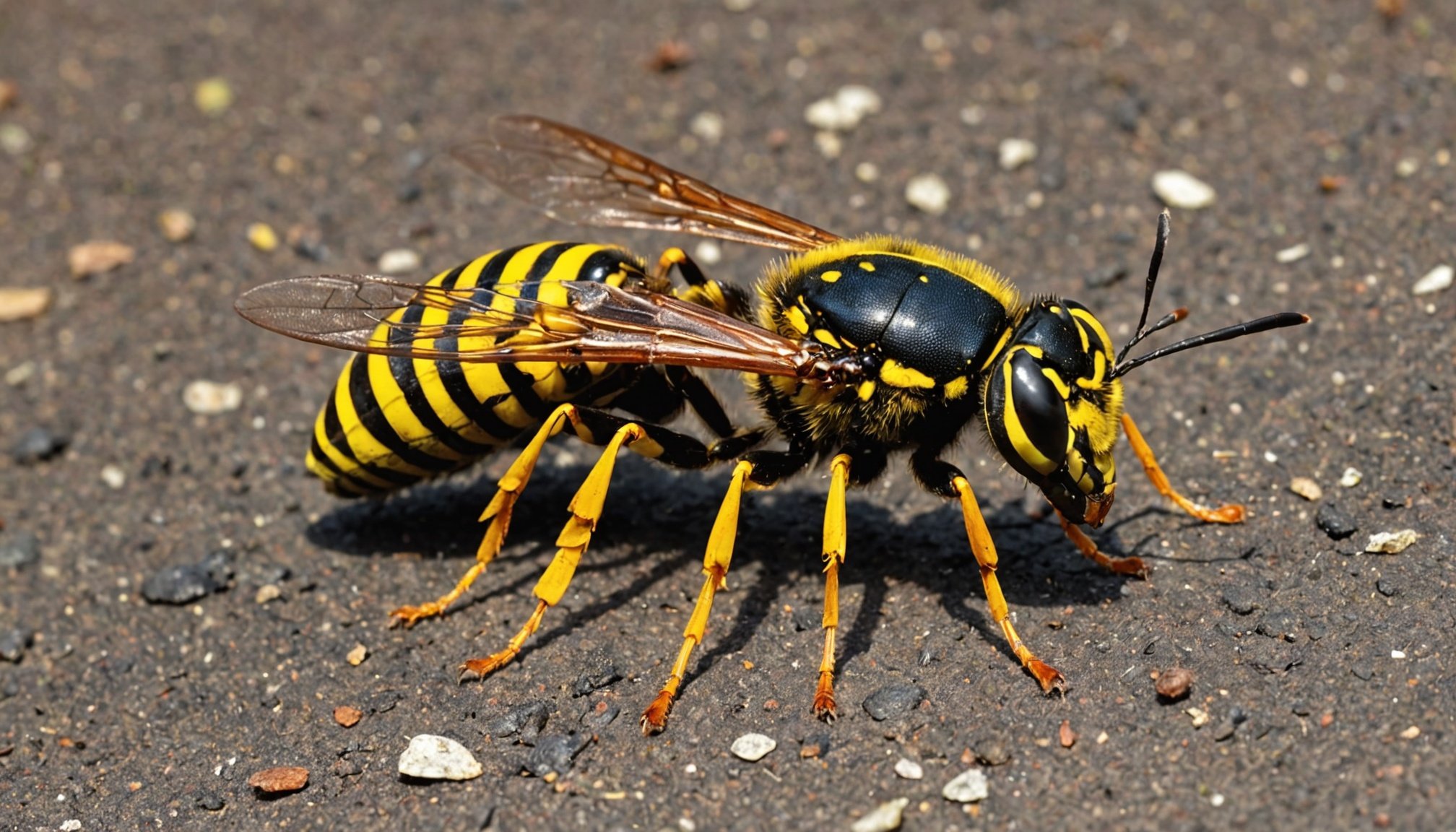Identifying Wasps and Ants
Pest identification is crucial in the UK, especially when camping. Identifying different types of wasps and ant species helps manage potential issues effectively. Common types of wasps often found at campsites include the European wasp and the Asian hornet. The European wasp is notable for its vivid yellow and black stripes and aggressive behavior when threatened. In contrast, the Asian hornet is slightly larger with a dark brown body and distinctive orange facial markings.
Ant species, such as the black garden ant and red imported fire ant, are prevalent in these environments. While black garden ants are generally harmless, they can become nuisances by invading food supplies. Red imported fire ants, however, are aggressive and their stings can cause significant discomfort.
Topic to read : Master the Perfect Camping Getaway: Discover UK Art Galleries and Museums En Route!
Recognizable signs of nests and infestations include visible clusters of insects and noticeable changes in the terrain where nests are constructed underground or in trees. Spotting these nests early is vital to prevent escalation into larger infestations. Knowing these characteristics enhances one’s ability to maintain a pest-free camping experience.
Prevention Strategies for Campsites
Setting up your campsite effectively can greatly reduce pest problems. Position tents and cooking areas away from bodies of water and dense vegetation, where insects thrive. Maintaining a clean environment is key; secure all food in airtight containers and regularly dispose of rubbish in designated bins to prevent pest attraction.
In parallel : Explore Ultimate UK Campsites for Memorable Horse Riding Adventures: Your Complete Guide to Booking Equestrian Getaways!
Importance of Food Storage and Waste Management
Good practices in food storage and waste management are essential to deter pests. Make use of lockable storage containers for perishables and consider elevated camping shelves to keep food off the ground. Regularly monitor and clean your campsite to avoid accumulating litter, as it becomes an ideal breeding ground for insects.
Utilizing Natural Repellents and Deterrents
Implementing eco-friendly practices can aid in managing pests responsibly. Natural repellents, such as citronella candles and essential oil sprays, offer effective defence against insects without harming the environment. Planting herbs like mint or basil around your campsite can act as additional deterrents. Employing these methods not only improves your current camping experience but also ensures the land remains welcoming to future campers.
Safe Removal Methods
Removing pests at campsites requires attention to safety and environmental considerations. Methods for dealing with wasps and ants ideally involve non-toxic solutions.
Wasp Nest Removal
Safe removal of wasp nests starts by identifying the nest location, often in trees or under eaves. DIY methods include using a wasp spray at dusk when wasps are less active. Ensure protection by wearing appropriate gear like gloves and a long-sleeved shirt to avoid stings. Once treated, the nest should be left alone until the insects are visibly inactive, indicating successful removal.
DIY Solutions for Ants
Ant management can often be managed with simple techniques. Diatomaceous earth is an effective DIY method to create a barrier that dehydrates ants. Vinegar solutions can disrupt scent trails, reducing ant activity. Focus on applying these solutions around potential entry points to your campsite to prevent further infestation.
Recommended Tools and Products
The use of non-toxic solutions is recommended, like natural repellent sprays, which are safe for both humans and the environment. Hand-held sprayers with adjustable nozzles are useful for targeted application, ensuring efficient pest treatment without harmful chemicals.
Legal Considerations in Pest Control
Understanding legal guidelines is critical for responsible pest management at campsites in the UK. Awareness of pest management laws ensures compliance while protecting both campers and the environment.
In the UK, pest control activities are governed by several regulations, such as the Control of Pesticides Regulations 1986. This framework restricts the use of certain chemicals and mandates the use of approved products. Implementing legally compliant methods not only safeguards human health but also preserves local wildlife.
For protected species, like some wasp varieties, laws stipulate specific handling procedures. Engaging professional pest control services, who are well-versed in these laws, is advisable when managing such species. Their expertise helps avoid penalties and ensures humane treatment.
Campsite owners hold responsibilities regarding pest control measures. They must maintain safe environments by adhering to proper disposal methods for waste, reducing insect habitats. Proactively managing pest issues also involves educating campers about relevant regulations and harmful activities to avoid. This collective responsibility fosters a safer and environmentally conscious camping experience.
Eco-Friendly Practices
Sustainable pest control methods provide practical solutions for campers aiming to minimise their environmental impact. These approaches not only protect the ecosystem but also enhance the camping experience through thoughtful interaction with nature.
Benefits of Using Eco-Friendly Solutions
Utilising environmentally safe methods targets pest control without disturbing local habitats. Implementing natural deterrents, such as planting herbs like lavender or sage around campsites, reduces reliance on chemical pesticides. These plants naturally repel pests while adding pleasant scents and green aesthetics.
Combining Sustainability with Pest Management
Achieving a green camping environment requires combining mindful practices with effective pest management strategies. Solutions like biodegradable repellents and solar-powered devices provide innovative alternatives to traditional pest control methods. Involving campers in these practices further nurtures a collective responsibility for preserving the natural environment.
Community initiatives play a vital role in promoting eco-conscious camping. Encouraging local groups to participate in regular campsite clean-ups and planting native vegetation contribute to a sustainable ecosystem. This, in turn, encourages wildlife conservation and maintains the site’s natural beauty, benefiting both present and future campers.
Dealing with Infestations
Encountering a pest infestation requires prompt and effective management to prevent escalation. Begin by assessing the severity of the infestation. Inspect the campsite for visible clusters of insects or nests, and listen for buzzing in hidden areas, which can indicate wasp nests. Look for ant trails and their point of entry to evaluate the problem’s extent.
If the infestation is extensive, considering professional pest control services becomes crucial. Specialists are trained to handle infestations safely, employing effective pest management techniques while abiding by regulations. They are particularly valuable if dealing with protected species or when legal compliance is essential.
In case of a pest encounter, having emergency strategies is vital. Always carry a basic first-aid kit to address bites or stings. Use calming measures, such as applying cold compresses, and relocate affected individuals away from the infestation site. Ensuring that all campers are informed about the presence of pests and the importance of remaining calm can minimise risk and prevent panic. Engaging the entire group in precautionary tactics reinforces a culture of safety.
Safety Tips for Campers
Camping offers adventure, but camper safety must be prioritised, especially concerning pests. To mitigate risks, take preventive steps. Always wear long sleeves and trousers, particularly at dusk or when near water. Consider applying insect repellent to exposed skin.
In case of a sting or bite, swift action is crucial. First aid guidelines suggest cleaning the affected area with soap and water. Apply a cold compress to reduce swelling and discomfort. An antihistamine can alleviate itching and minor allergic reactions. For severe reactions, such as difficulty breathing or extensive swelling, seek immediate medical attention.
Informing fellow campers about potential pest-related risks ensures everyone knows what to expect. Share knowledge about identifying harmful insects, like wasps and certain ants, and advise on emergency response procedures. Keeping a well-stocked first-aid kit, including items for treating insect bites and stings, reinforces preparedness.
By understanding pest safety measures, campers can enjoy the outdoors with confidence. These precautions not only safeguard individuals but foster a respectful interaction with the natural habitat. Awareness and preparation are key in maintaining a safe and pleasant camping experience.










